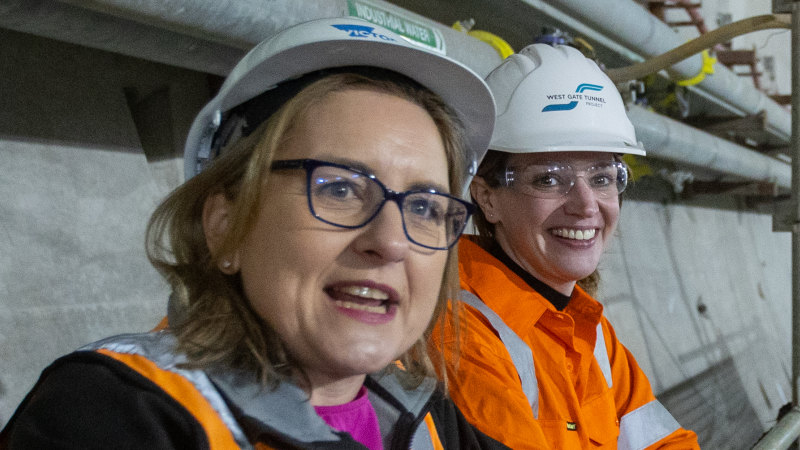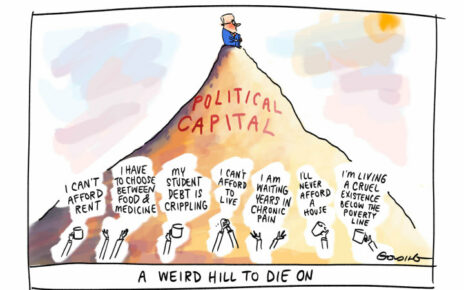Save articles for later
Add articles to your saved list and come back to them any time.
The federal government is on a collision course with the states and territories over roads, railway lines and roundabouts after Infrastructure Minister Catherine King revealed that without changes to the current $120 billion pipeline of work, no new projects could be started until 2033.
King said an independent review of the pipeline that was put in place by the Coalition, due to be released in coming days, had found it would be almost impossible to deliver promised projects that were sucking money and resources away from nationally important work.
Victorian Premier Jacinta Allan is among a group of premiers worried about the federal government’s plans to overhaul infrastructure spending.Credit: Simon Schluter
“Significantly, they found that, without making significant immediate changes to program settings, the Australian government cannot afford to meet identified cost pressures, nor add any new projects to the pipeline in the next 10 years,” she said on Tuesday.
King immediately faced push-back from the states, with Queensland Premier Annastacia Palaszczuk – who faces an election next year – vowing to “stand up” to Prime Minister Anthony Albanese, saying her state faced losing $1 billion a year in federal infrastructure funding.
There have been growing concerns about the size and scope of the 10-year plan, which was increased by $18 billion as part of the Morrison government’s 2022 re-election campaign and now covers more than 800 projects.
This month, the International Monetary Fund said governments had to cut some of the spending, arguing they were adding to inflationary pressures across the economy. The Reserve Bank last week noted public infrastructure was stretching economic capacity in parts of the country.
King said the review, being conducted by infrastructure experts Mike Mrdak, Clare Gardiner-Barnes and Reece Waldock, had found it would be impossible to deliver the current pipeline of projects for $120 billion.
“If we continue as we currently are, we cannot commit to any new projects for the next 10 years – until 2033. Many of the projects currently in the [infrastructure investment program] will never be built and can never be built,” she said.
King said no funding would be cut from the $120 billion pipeline, but the focus would be on getting rid of waste and building projects that delivered economic benefits to the country. The review found the cost of projects yet to start had blown out by $14.2 billion.
The federal government would also move to fund future projects with the states and territories on a 50:50 basis, rather than 80:20 or fully funding them, and would commit money only for the planning stage of projects and then release the rest once the final cost was known.
Infrastructure Minister Catherine King says without changes, the federal government will not be able to start any new infrastructure projects for a decade.Credit: Oscar Colman
The changes put some large projects that are only in the early planning phase at risk.
In NSW, the federal government has promised $2 billion of $2.5 billion for an upgrade of the Great Western Highway between Katoomba and Lithgow. The project is expected to get under way from 2027-’28.
In Tasmania, the previous government committed to cover 80 per cent of a $420 million roads package in the marginal Liberal-held seat of Bass. Almost all of that project is not planned to start until 2031-’32.
Speaking in the Queensland parliament, Palaszczuk said the federal government should continue to contribute 80 per cent of major regional projects, including $13 billion of promised work on the Bruce Highway.
“We will stand up to the federal government. We will stand up to the prime minister and say Queensland deserves its fair share and nothing less,” she said.
NSW Premier Chris Minns said he was very concerned about federal cuts to infrastructure and warned there were other battlegrounds looming with the Albanese government, including over education and NDIS funding.
“NSW taxpayers pay a lot of money in income taxes to the Commonwealth government and we deserve our fair share,” Minns told ABC Sydney.
“I’m not going to gild the lily for her [King] – that’s a major concern for the NSW government for a few reasons.”
Victorian Premier Jacinta Allan said she was less worried about a change to the funding split than actually getting cash out of the federal government.
“For too long, on too many projects here in Victoria under the former federal Liberal-Nationals government, there was no funding split because it was zero,” she said.
“It was zero funding that we got from Canberra on Metro Tunnel, on West Gate Tunnel. We’ve removed 72 level crossings without $1 from the federal government.”
Federal opposition infrastructure spokeswoman Bridget McKenzie said a change in the funding share between the federal and state governments would hurt regional people and force the states to take on more debt.
“Labor’s policy is set to hit regional Australia the hardest, with regional road funding set to be cut by 30 per cent. By requiring states to invest at least 50 per cent in road projects, many major productivity-enhancing projects will not be funded at all,” she said.
Cut through the noise of federal politics with news, views and expert analysis. Subscribers can sign up to our weekly Inside Politics newsletter.
Most Viewed in Politics
From our partners
Source: Read Full Article




